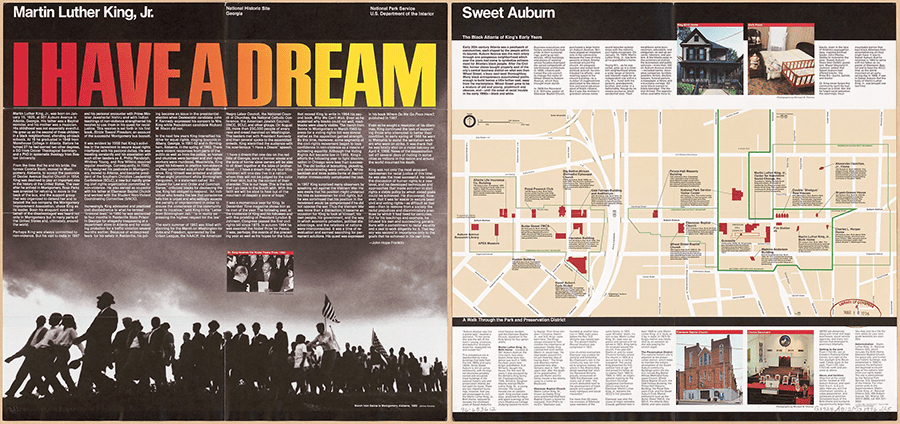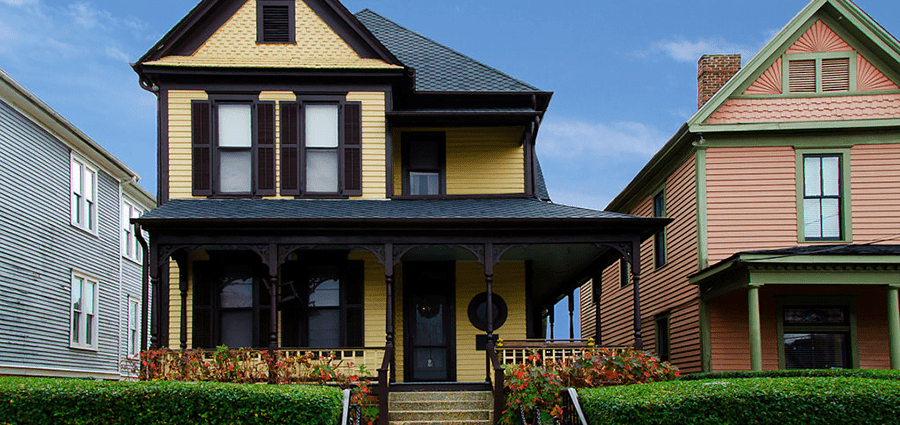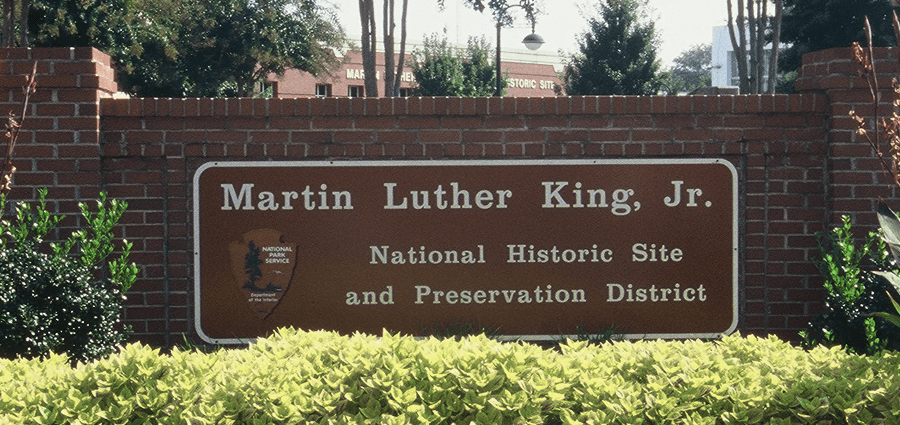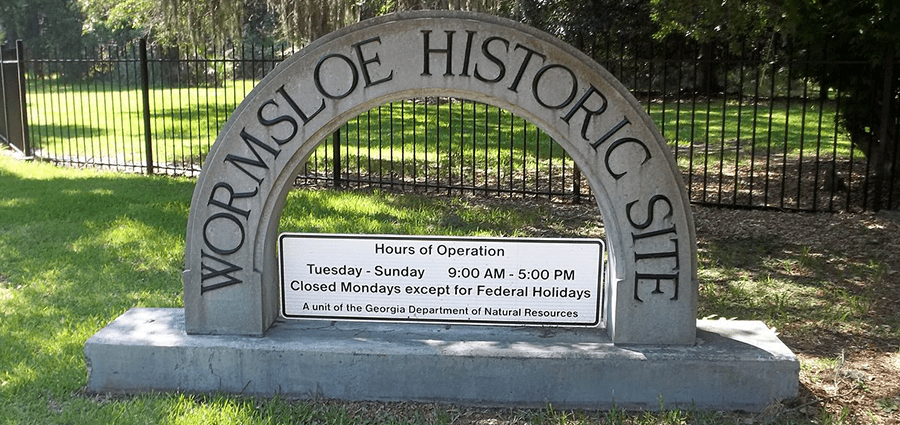Walk in the footsteps of Dr. Martin Luther King, Jr. in Atlanta at the national park dedicated to his life and leadership of the civil rights movement. This impactful historic site provides an immersive journey through Dr. King’s most active years, from his childhood home to his final resting place. See the church where he preached and visit the International Center for Nonviolent Social Change that carries on his legacy. Let the park inspire you with Dr. King’s justice, equality, and peace vision.
Location
The park stretches through downtown Atlanta, centered around Auburn Avenue, historically known as “Sweet Auburn.” It lies just 2 miles east of downtown hotels and major attractions like Centennial Park, the Georgia Aquarium, and the World of Coca-Cola.

Details
Address: 450 Auburn Ave NE, Atlanta, GA 30312
Phone: (404) 331-5190
Website: https://www.nps.gov/malu/index.htm
History
Martin Luther King, Jr. was born in Atlanta in 1929 and grew up in the Sweet Auburn neighborhood. The home where young Martin lived with his parents and siblings from age two is preserved as part of the park. After graduating from seminary in Pennsylvania, Dr. King became the pastor of Ebenezer Baptist Church in 1960, where his father had preached for years.
From this spiritual and geographic base, Dr. King led civil rights campaigns for desegregation, voter registration, and social justice until his assassination in 1968 at just 39 years old. His grave site near Ebenezer Baptist offers a place of pilgrimage and reflection.
Established in 1980 to honor Dr. King’s life and contributions, the park encompasses several blocks of historic buildings central to his work. Exhibits, tours, and programs illuminate Dr. King’s vision of nonviolence that still resonates worldwide.
Key Historical Facts Of Martin Luther King Jr. National Historical Park
- The park is in Atlanta, Georgia, and spans several blocks, including Martin Luther King Jr.’s birth home, the Ebenezer Baptist Church where he preached, and his and Coretta Scott King’s grave sites.
- The park was established in 1980 to commemorate Martin Luther King Jr.’s life and contributions to the Civil Rights Movement. The park was officially renamed after him in 1994.
- The home where Martin Luther King Jr. was born in 1929 is preserved as part of the park. Visitors can take a National Park Service ranger-guided tour through the home.
- Ebenezer Baptist Church, where Martin Luther King Jr. served as co-pastor from 1960 until his death in 1968, is part of the park. This church was the center of organizing for civil rights efforts.
- The park includes The King Center, built in honor of Martin Luther King Jr. and Coretta Scott King. It includes a museum with exhibits about Dr. King’s life and work.
- Historic Fire Station No. 6 is also part of the park. This station housed African-American firefighters who served the Sweet Auburn community where Dr. King lived and worked.
- Martin Luther King Jr.’s grave site is on the grounds of the reflecting pool and amphitheater at The King Center. Visitors can walk through the memorial area and reflect on Dr. King’s legacy.
What to See and Do
Start at the visitor center to explore interactive exhibits and watch an introductory film. National Park Service ranger-guided tours are available of the childhood home where young Martin grew up, offering insights into his early life. Across the street sits the two-story Queen Anne-style house that served as Dr. King’s parsonage residence while he led Ebenezer Baptist.
Walk down Auburn Avenue to see the fascinating new expansion – the King Center and the nonviolence exhibit hall called the Beloved Community. State-of-the-art displays engage visitors in carrying on Dr. King’s work through nonviolence, forgiveness, and reconciliation principles.
End your journey at Dr. King’s grave site adjoining Ebenezer Baptist, a moving place of quiet reflection surrounded by the beauty of the Freedom Hall complex.

Top Attractions
- Touring the King’s home and Parsonage
- Visiting Ebenezer Baptist Church
- Interactive exhibits at the Visitor Center
- Inspiring exhibits at the King Center expansion
- Reflecting at Dr. King’s grave site
Nearby Attractions
Downtown Atlanta lies just 2 miles west, where more civil rights history awaits. The Center for Civil and Human Rights powerfully immerses visitors in the struggles and victories of the movement. Nearby, the World of Coca-Cola and Georgia Aquarium provide fun outings after heavy history lessons.
15 minutes south of the park, the Martin Luther King Jr. National Historic Site contains Dr. King’s actual birth home, the church where his father preached, and historic Fire Station No. 6.
Nature lovers can find scenic respite in Atlanta’s sprawling Historic Fourth Ward Park, the Atlanta Botanical Gardens, and hiking at Sweetwater Creek State Park just 20 minutes west of the city.
Tips for Visiting
Atlanta enjoys a mild climate ideal for visiting year-round. Spring and fall offer peak comfort, with average highs around 70 °F and lower humidity.
Summers are hot and muggy, with temperatures in the 80s-90s°F. Seek out air-conditioned indoor exhibits to escape the heat. Drink plenty of water and utilize shade. Afternoon thunderstorms are common.
Winters are relatively mild, with highs in the 50s°F, but pack warm layers and rain gear for fickle weather. Some exhibits keep more limited hours.
Weekends draw the largest crowds. Arrive early to avoid long ticket lines and tour waitlists. Parking is very limited, so consider public transit.
Wear comfortable walking shoes, as the park covers several blocks. Mobility scooters can be rented for accessibility. Backpacks and strollers are permitted.
Photography is allowed but no tripods or drones. Talking and noise should be kept low inside memorial spaces like Ebenezer Baptist and Dr. King’s tomb.

Conclusion
The Martin Luther King, Jr. National Historical Park profoundly commemorates Dr. King’s life and transformative work as the quintessential leader of the American civil rights movement. Here, you can walk in his footsteps, see the spaces that shaped him, and find inspiration to carry his vision forward. Let Dr. King’s courage and message of nonviolence move you at this unforgettable historic site.
Respectful Conduct
The Martin Luther King Jr. National Historical Park is more than a monument – it is a living memorial and sacred space dedicated to furthering Dr. King’s legacy. When you enter this meaningful place, reflect on how to conduct yourself respectfully.
Speak softly and refrain from disruptive noises or behaviors within the historic churches and exhibits. The Ebenezer Baptist Church, where Dr. King once preached, is still an active place of worship. Listen closely to hear the echoes of Dr. King’s powerful sermons within its walls. In the visitor center exhibits, create space for others to have meaningful experiences.
Aim for respectful dialogue when discussing sensitive race, prejudice, and injustice topics. The park has appropriate places to wrestle with challenging aspects of our shared history. Doing so opens doors to greater understanding. But maintain awareness so your conversations build others up rather than tear them down.
Treat all facilities and displays with utmost care. As a national memorial to one of America’s most iconic civil rights leaders, this park provides invaluable insights. Help preserve it so future generations can be similarly enriched. Walk gently and leave no trace, allowing this space to maintain its sacred spirit.
Visiting this park is an opportunity to reflect on building a more just society, as Dr. King envisioned. We take steps toward reconciliation and healing by understanding the struggles of those who came before us. Let your time here open your mind and soften your heart.




